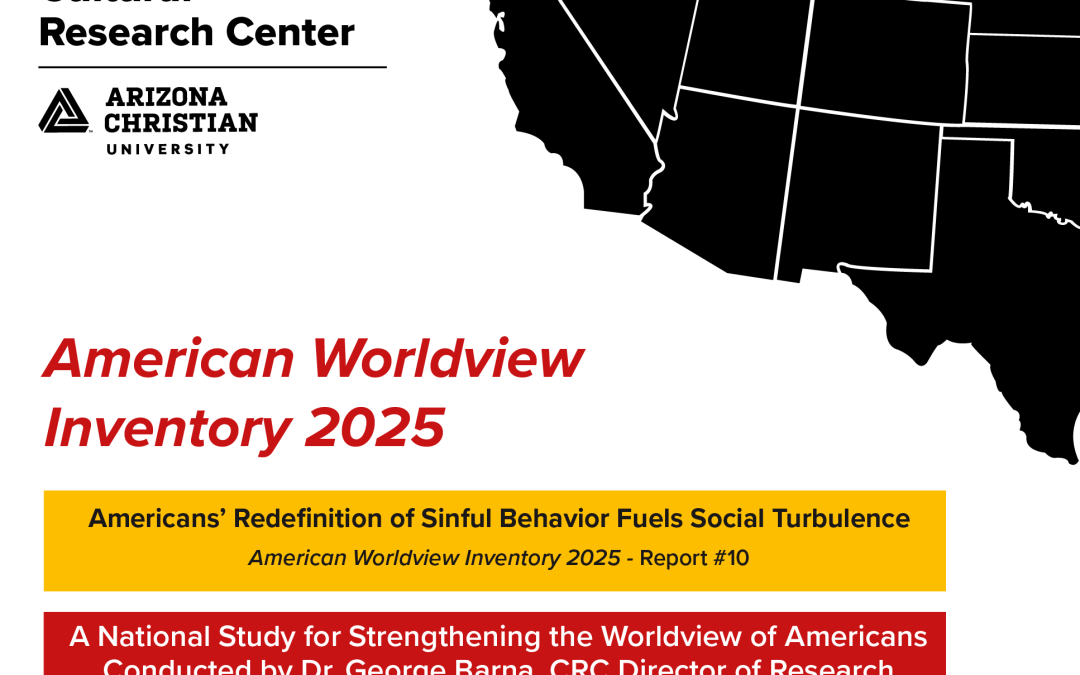(GLENDALE, AZ — October 21, 2025) — New research reveals a steady erosion in how Americans understand and define sin. Asked about 12 specific behaviors—each traditionally considered sinful—the majority of Americans now say only half still deserve the label “sin,” according to new research from the Cultural Research Center at Arizona Christian University.
These findings signal a dramatic shift in the nation’s moral compass, and builds on earlier reports documenting widespread confusion about the existence and nature of sin. And veteran researcher and author of the study, Dr. George Barna, warns that this shift away from biblical understanding of sin is negatively affecting American society.
As Barna explains, “The data patterns suggest the social turbulence common across the country for the past decade—reflected in significant changes in family structure, personal relationships, integrity and ethics, faith practices, and lifestyle choices—can be traced directly to these shifts away from traditional, biblical views on sin.”
Here are key findings from the new American Worldview Inventory 2025 report:
- Deception Seen as the Gravest Sin: Nearly three-quarters of adults (73%) say lying, deceiving, or manipulating others for personal gain is sinful—the highest of all behaviors tested.
- Decline in Reverence and Worship Standards: Six in 10 adults believe using God’s name irreverently is sinful, and a similar share (59%) say worshipping any being other than the God of the Bible is wrong.
- Sexual Morality Deeply Divided: Slight majorities view sex outside of marriage (55%), pornography use (55%), and recreational drug use (54%) as sinful.
- Moral Ambivalence on Abortion and Integrity Issues: Americans are evenly split over whether abortion, sexual fantasies, and cheating on taxes are sinful. Only about half label these actions as sin.
- Most No Longer Condemn “Lifestyle” Sins: A majority of adults reject the idea that drunkenness (42%), gambling (40%), or working on the Sabbath (23%) are sinful—signaling widespread normalization of behaviors once commonly viewed as moral failings.
- Generational and Secular Shifts Undermine Biblical Morality: Across nearly every issue, younger adults and the religiously unaffiliated are far less likely to define traditional moral behaviors as sinful—driving the nation’s continued shift away from biblical standards of right and wrong.
Although younger and non-religious adults are increasingly unlikely to view traditional moral behaviors as sinful, the opposite remains true among committed Christians and older Americans. Across nearly every behavior measured, Boomers and older generations were more likely than younger adults to identify lying, sexual immorality, and irreverence toward God as sin.
In addition, those most likely to preserve biblical morality are adults with a biblical worldview and theologically defined born-again Christians. For example, nearly all adults with a biblical worldview (99%) and most born-again Christians (96%) view lying as sinful, compared to less than half of the general population on many other moral issues.
These findings underscore the widening divide between Americans whose moral views are anchored in Scripture and those whose ethics are shaped by cultural or secular influences.
Prior AWVI 2025 reports here and here on the nation’s views about sin showed that although most adults believe sin exists, there is widespread confusion and controversy—and often ambivalence—regarding what constitutes sin, who commits sins, what can or should be done about sin, and whether sin even matters. In addition, fewer than one out of five adults maintain a consistently biblical perspective on sin.
Barna observed that these changing views of sin are directly linked to America’s broader moral decline. “Unfortunately, parallel long-term tracking data related to the behaviors that people consider to be sinful does not exist,” he said. “However, there appears to be a clear and moderately strong link between generational differences of opinion related to sin and the ongoing redefinition of morality in American society.”
He noted that much of this shift is being driven by younger Americans. “The adult portion of Gen Z is currently less than 10% of the adult population,” he stated. “But when all of the members of that generation are 18 or older, that group will be nearly four times their current proportion of the total adult population.”
“In other words, some of the major growth drivers of our population are people groups that reject biblical morality,” he explained.
As for the path forward, Barna explained, “If Christians in America want a nation based on biblical morality, they must be clearer and more assertive in teaching, evaluating, and modeling of the biblical worldview and its resultant lifestyle choices,” Barna said.
The report, “Americans’ Redefinition of Sinful Behavior Fuels Social Turbulence,” from the American Worldview Inventory 2025 is available at the CRC Research Page.

